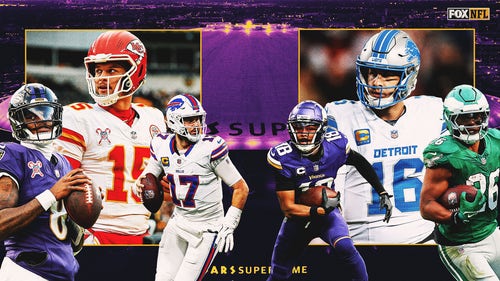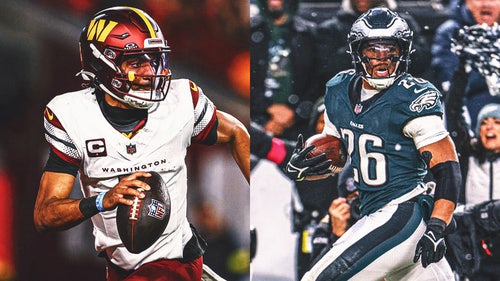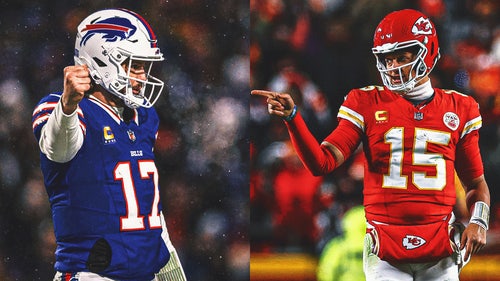
What can the Atlanta Falcons expect in a Julio Jones trade?
By Randy Mueller
Special to FOX Sports
June 1 is one of the most important dates on the NFL calendar.
You'll hear it referenced throughout the offseason.
"If that player is going to be released, it'll happen on or after June 1."
"Big trade on the horizon? Just wait until June 1."
What makes the first day of June such a key date in the post-draft phase of team-building? After this date, players' contract proration, for salary-cap counting purposes, can be pushed into the following year. This allows teams to free up money in 2021 by releasing or trading players. Some teams need space; others have space.
In Atlanta, next Tuesday has long been circled as a day of reckoning for the Falcons, something insiders throughout the league have known all spring.
Therein lies the problem for new Falcons general manager Terry Fontenot.
When news came out this week that franchise icon Julio Jones, a seven-time Pro Bowl receiver, asked to be traded, it was characterized by some as a big surprise. I’m here to say that nothing could be further from the truth.
Any good general manager in the NFL can read the tea leaves.
Fontenot tipped his hand long ago when he admitted in an interview that it would be difficult for his team to keep Jones based on "salary-cap" ramifications alone. The new GM was paving the way for an exit and using the cap as a reason for the move.
From that interview on, teams around the league have known that Atlanta is going to have to decide to release or trade Jones. That comment was the equivalent of putting a "FOR SALE" sign on the front yard in Flowery Branch, Georgia.
To that end, Fontenot knowingly gave up his leverage to both explain and start the wheels in motion for Jones' exit.
Painting this story as Jones no longer wanting to be in Atlanta or that he asked for a trade is frankly untrue. The fact is the Falcons need his money – plain and simple — and the league has known that for quite some time. Because of that, the Falcons have lost leverage.
On one hand, Fontenot made it clear publicly how much the Falcons love and value Jones' history with the franchise, but he also made it clear that he was going to have to move the player.
The other 31 teams know the Falcons are up against it, so getting market value is really not an option.
I’ve read the possible packages that some think Atlanta will be able to garner in a trade. They're all pipe dreams. Because of his salary, age, recent injuries (Jones missed seven games last season) and, most of all, the timing, someone is going to get an All-Pro receiver at a discount.
Marcellus Wiley on whether Julio Jones should stay in Atlanta, talks legacy with no ring | SPEAK FOR YOURSELF
It has been reported that the Falcons are seeking a first-round pick. That's not going to happen. They have had time to demand that for the past month, but as we approach June 1, they will have to get more realistic.
Fontenot’s positioning becomes even tougher because at the end of the day, he will be forced to take what he can get.
It’s not an enviable position: A new GM trading a face of the franchise for less than he is worth, but such is the salary-cap situation around the NFL in the "post-COVID 19 era." Hey, the Texans let J.J. Watt walk for nothing.
The story gets even sadder for Falcons fans because Jones can still play. His career numbers are only slightly trending down (though he played just 41.7% of the offensive snaps in 2020). When you consider that he is averaging 95.5 yards per game, that level of production is unheard of.
I even went back through some film from 2020, and Jones' skill set will fit almost every offense. He can still run. He’s a big target and easy to find over the middle in traffic. He sees and reads coverage very well, so he adjusts and finds open areas.

Even at age 32, Julio Jones is a nightmare for NFL defenses when he's healthy. (Photo by Kevin C. Cox/Getty Images)
He is slightly better running to spaces against zone coverage than separating with suddenness against man-to-man. His speed-cuts and ability to eat up a cushion with powerful strides are still very much part of his game.
He is still willing to block in the running game, though he might not finish like he once did. His 6-foot-3, 220-pound frame remains a positive when leaning on smaller corners and safeties.
As with all of us as we age, there is some self-preservation to his game, but overall, the competitive spirit is still there.
One thing that makes it somewhat easier for the Falcons to move on from Jones – unlike what is a major sticking point with the Packers in the Aaron Rodgers saga – is that we know about his replacements in Atlanta. We know Calvin Ridley is good, we have seen the flashes of what Russell Gage can become, and, of course, Kyle Pitts is a unicorn who looks like a generational talent.
Sure, the Falcons might need to add another veteran receiver, but that is doable.
Landing spots for Jones are being thrown around like strokes on the first tee of a weekly golf game. If we are being realistic, though, one must start with teams that can take on Jones and his $15 million base salary. You have to combine a team's need with its cap space and willingness to part with compensation. That will limit the market. In other words, several moving parts have to come together.
For more up-to-date news on all things NFL, click here to register for alerts on the FOX Sports app!
These teams make the most sense: The Patriots, as of May 15, have $14.9 million in cap space, and the Chargers have $19.4 million. Sure, you could make a case for the Packers or Seahawks, but they have no cap space. The one NFC exception might be the Niners, who have $17.8 million and seem to be willing to give to get.
Atlanta has been roundly dismissed on its asking price of a first-round pick, mainly because everyone knows the Falcons have to get real.
I think they would be ecstatic to get a second-rounder, but more than likely, they will settle for a third-rounder, just to have use of the cap dollars and move about their offseason business. That's a lot to ask of a first-year GM.
How does the saying go? Education is expensive.
So we wait while these teams silently call Atlanta’s bluff. June 1 is in sight.
Randy Mueller is the former general manager for the Seattle Seahawks, New Orleans Saints and Miami Dolphins. He spent more than 30 years working in NFL front offices as a talent evaluator. Follow him on Twitter or at muellerfootball.com.










